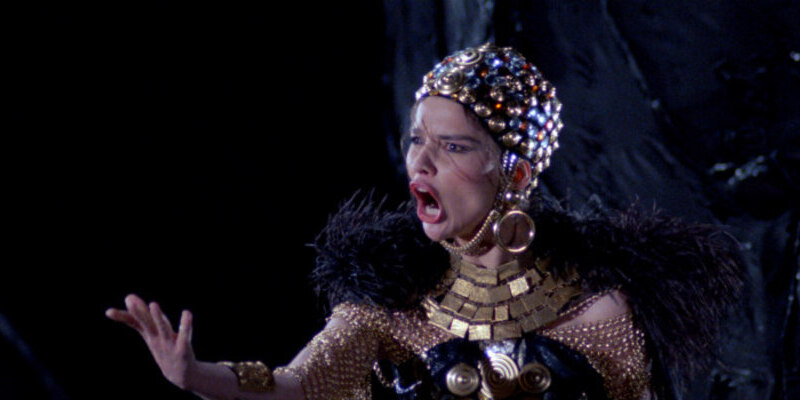
Review by
Eric Hillis
Directed by: Dario Argento
Starring: Cristina Marsillach, Ian Charleson, Urbano
Barberini, Daria Nicolodi, William McNamara

1987 provided the final death throes of Italian exploitation cinema with
two outstanding theatrical set gialli - Dario Argento protégé Michele
Soavi's debut
Stage Fright
and Argento's own Opera (aka 'Terror at the Opera'), his last
genuinely great movie and a summation of everything he had become known for
up to that point. With over the top and heavily stylised violence, beautiful
cinematography, technically audacious filmmaking, hysterical women,
sumptuous fashion and of course the titular music, Opera might
be the most Italian movie ever made, and it makes for an ideal entry point
for anyone wishing to explore the genre cinema of that most artistic of
nations.

While thrilled with her big break, Betty is overcome with an ominous feeling of dread, all too aware of the cursed reputation of Verdi's opera. During her debut performance, in a nod to Phantom of the Opera's chandelier, a set of stage lights come crashing down, while backstage a masked, black-gloved (of course) figure murders a stage hand. Later that night, the same mysterious killer (whose unique vocal stylings must surely have influenced those of the Jigsaw killer in the Saw franchise) tracks down Betty at her boyfriend's apartment and forces her to watch as he brutally murders her beau. Rather than go to the police, Betty oddly flees the scene as though believing herself partly guilty. Could it be connected to her recurring nightmare of the same killer dispatching various young women?

Argento made this film after being kicked off a stage production of Verdi's
'Rigoletto', his vision considered too "cutting edge" (one can only imagine)
for Italian opera circles. He claims he wanted to push his filmmaking to the
limits with Opera, and boy does he. Opera may not be the best Argento (Deep Red
and Suspiria vie for that title), but it's arguably the most
Argento, featuring some of the most accomplished and outrageous set-pieces
of his career. The highlight is a sequence that begins by recalling Terence
Fisher's Dracula, as Betty and her agent, Mira (Daria Nicolodi, recently divorced
from the director), begin to fear the killer may be inside their apartment,
and culminates with an extreme close-up of a bullet fired through a keyhole,
exiting the back of Mira's head (killing off his ex-wife on screen will no
doubt have filled Argento with sadistic glee) and exploding a telephone at
the far end of a corridor. Elsewhere there are lengthy tracking shots, and a
"raven's eye" sequence for which Argento and his crew had to invent
technology to achieve a shot that could be relatively easily replicated with
a drone today. A scene in which the killer tracks Betty through the air
vents of her apartment block is one of Argento's most nail-biting
sequences.
Opera might be Argento's most self-reflective film too. There are points in which female characters comment on his much debated misogyny, and the theme of a killer forcing someone to watch helplessly as he goes about his work (a clever subversion of both Michael Powell's Peeping Tom and Alfred Hitchcock's Rear Window) is itself a commentary on the power of a horror filmmaker over his audience - "He makes me watch but never shows his own face!"

Annoyed at how often viewers would cover their eyes during his violent
set-pieces, Argento has his killer tape thin needles under Betty's eyes,
obliging her to watch his atrocities lest she tear her eyelids off. Those
who do turn away will miss out on how restrained Argento actually is when it
comes to the violence here. Like John Carpenter with
Halloween, Argento gives us one explicit killing early on, just to set us on edge,
but holds back for the subsequent sequences. When the killer has to use a
pair of scissors to cut open a woman's throat to retrieve a swallowed
macguffin, Argento doesn't simply show us the implement tearing through
flesh, but rather focusses on its crunching plastic handle, letting our
minds fill in the gruesome blanks.
Along with cinematographer Ronnie Taylor and composers Brian Eno, Bill Wyman and Claudio Simonetti, Argento creates one of his classic settings, an indefinable dream world, recognisably Italian to some degree yet existing only in the filmmaker's wild imagination. Like David Lynch, Argento is one of those artists who you can't help but suspect has a few screws loose, which makes his style so impossible to genuinely replicate. Never one to care about plot logic or realistic human behaviour, Argento pushes your limits of disbelief suspension with some ludicrous ideas here, none more so than the notion that ravens will seek the killer out of vengeance for the bird they earlier slayed (Argento claims one of the ravens used on set spoke in a human voice; call the men in white coats!), an idea as silly as the premise of his early thriller Four Flies on Grey Velvet, in which Argento seems to believe the retina records the last image you see before you die. To Argento, a plot is simply a string to hang his set-pieces from, and if you're the sort of viewer who cares more about the string than the set-pieces, his films aren't for you. If you can surrender yourself to his fevered imagination and the intoxicating imagery it produces, you're in for the sort of cinematic experience few filmmakers can rival. If you can't, well maybe cinema just isn't the art-form for you.

Opera is on Shudder UK now.
